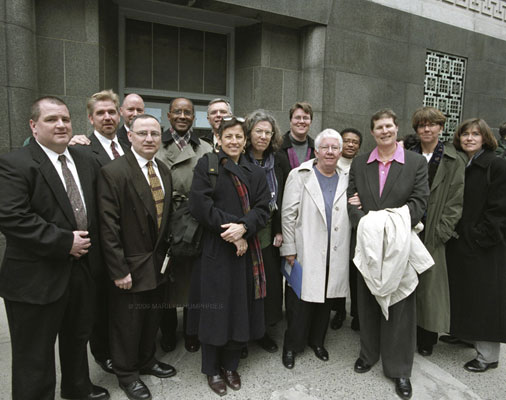Two cases mark the recent change in the legal status of homosexual marriage: Baehr v. Lewin (1993) and Goodridge v. Department of Public Health (2003). In Baehr, the finding of a constitutional right based on the guarantees of equal protection was not enough to change laws prohibiting gay marriage, but in Goodridge, where the same equal-rights guarantee was found, the state interest claims did not convince the majority of justices that homosexual marriage should remain prohibited. The constitutionally protected right of homosexuals to engage in sex was secured in a case which concluded months before Goodridge—Lawrence v. Texas (2003).
The right of gays to marry was based on the U.S. and state constitutions, which guarantee equal rights.
Three couples, who met all other marriage requirements, were denied licences in 1990, after which they filed a lawsuit in 1991 against the Hawaii Attorney General, John C. Lewin, seeking to have the exclusion of gays from marriage certification declared unconstitutional. Lewin was replaced by the State Director of Health, Lawrence H. Miike in later stages of the trial proceedings. In 1993 the Court found that denying homosexuals marriage licences was unequal treatment and therefore unconstitutional, and ordered the state to provide evidence of justification for abridging Constitutional rights. Judge Chang ruled in 1996 that none of the state’s claims to compelling interest in restricting marriage rights were valid by the strict scrutiny test, and even if the state had proven such interests, the state had failed to prove that the statute was narrowly tailored to avoid unnecessary abridgment of constitutional rights. Chang ordered the state not to refuse marriage licences to any qualified applicants, including same-sex couples, but stayed the ruling because of the position newly married couples would be in if the Supreme Court later reversed Chang’s decision. In 1998 Hawaiian voters approved an amendment to the Hawaii constitution limiting marriage to opposite-sex couples and in 1999 the Supreme Court did overturn Chang’s judgement.
The first U.S. Supreme court trial to find that same-sex couples had the right to marry was Goodridge v. Dept. of Public Health (2003). Gay and Lesbian Advocates and Defenders (GLAD), on behalf of several same-sex couples who had been denied marriage licences in 2001, sued the Massachusetts Department of Health. The Superior Court found for the defendants, believing that altering the Commonwealth’s centuries-old tradition of restricting marriage to opposite-sex couples was a matter for the legislature, who had, the Court noted, recently defended same-sex marriage limitations. The trial was appealed to the Supreme Court.
After looking at the state constitution’s guarantee of equal protection and due process, a small majority (5-4) found the prohibition of one class of citizen’s licence to marry was unconstitutional, and found that no rational reason existed to override this constitutional right. The large minority found several of the state’s interest claims convincing, such as the importance of marriage as an institution based on the raising of children and the state’s reluctance to assign equal benefits, obligations, and responsibilities to homosexual couples through marriage. Another reason for dissent was the belief that the power to regulate marriage lies not with the judiciary, but with the Legislature, and therefore, even if the ruling in favor of gay marriage was a step forward socially, it was a misstep legally and constitutionally.
By Day Blakely Donaldson
Sources:
